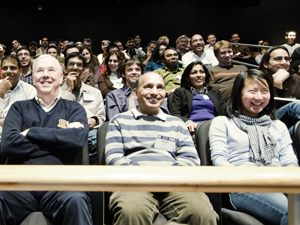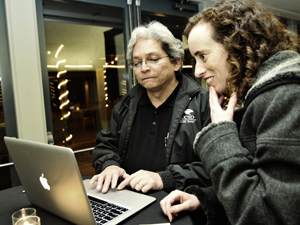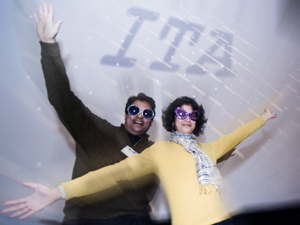Information Theory and Applications Workshop Seeks 'Essence of Information' in Diverse Fields
By Tiffany Fox, (858) 246-0353, tfox@ucsd.edu
San Diego, Calif., Feb. 26, 2009 — Leading academic and industry researchers from a variety of fields convened at the University of California, San Diego, Feb. 8-13 for the fourth annual Information Theory and Applications (ITA) Workshop, a venue for discussing the latest challenges and solutions in cellular communications, networking and other information-based pursuits.
|
This year's workshop was the biggest yet, with more than 565 participants hailing from nearly every major research university, as well as corporations such as AT&T Labs, Google, IBM, Microsoft, Mitsubishi Electric, Qualcomm and Yahoo. The workshop's 300-plus presentations spanned the course of a week at UC San Diego's Atkinson Hall, home of the California Institute for Telecommunications and Information Technology (Calit2). The workshop was organized by Calit2's Sanjoy Dasgupta, Massimo Franceschetti, Tara Javidi and Young-Han Kim.
"Most conferences are vertically designed and tend to attract people from one area," said Alon Orlitsky, a professor of computer science and engineering at UCSD and director of the Calit2-based ITA Center. "This conference is more horizontal. It attracts people from diverse disciplines — information theory, communications, machine learning, computer science, statistics — and also from both academia and industry, encouraging them to collaborate and speak to each other. A lot of the underlying ideas in those disciplines are similar; the basic concept behind all of them is to get the most out of data and find the essence of the information we observe."
One example of this confluence between research and development was pointed out by Ali Panah, a graduate student in electrical engineering from the University of Texas, Austin.
"Take the Apple iPhone," Panah explained during a break in the workshop. "The packaging for the phone says '3G,' but the average person wouldn't know what 3G means. Well, the people at this conference are the people who develop 3G, if that tells you anything. What really struck me about this conference was the technical level, which was quite high."
The organizers say that in general, the participants at ITA focus their research on improving cellular communication, internet traffic and online recommendation systems, like those for Amazon.com.
"For the first time, this year's ITA banquet was sponsored by Qualcomm at the company's headquarters," Orlitsky noted, "CEO Irwin Jacobs spoke at the banquet and said his company is based on ideas that come out of information theory and communication research, some of the main topics presented at the ITA conference."
|
The workshop has several special features not found in most other conferences. One example is the "open-problem session," a forum for researchers to present incomplete findings to a diverse set of colleagues, and see if any of them might be able to contribute to the solution. In addition, an entire day of this year's workshop was devoted to tutorials, with speakers from the worlds of machine learning, quantum computing, streaming algorithms and game theory. Another highlight this year was a panel discussion on funding opportunities from the National Science Foundation and the Air Force Office of Scientific Research. Participants were also able to speak with a new program director of NSF during a teleconference in the Calit2 auditorium.
The workshop's keynote speaker, Electrical Engineering and Computer Science Professor Madhu Sudan of the Massachusetts Institute of Technology (MIT), spoke about "Local Algorithms and Error Correction." His presentation reflected his work at the crossroads of computer science and coding, a synergy reflective of the workshop's theme.
Javidi and Franceschetti also noted that hosting the workshop at a university rather than a commercial venue makes it more accessible to UCSD students. Many of these students — as well as others from universities around the world — presented their research at the event's "Graduation-Day" session. Another benefit is that undergraduates, graduates and post-docs have an opportunity to learn from faculty-presented papers, direct from the source.
Abstracts of all talks are available online. The keynote presentation, the panel discussion and the open-problem sessions were webcast in real-time, and will soon be made available for on-demand viewing.
To further enrich the collaborations formed at ITA, the workshop organizers put an emphasis on fun, with an entertainment session called "Relief: Information Therapy" that features light-hearted interviews with luminaries in the ITA world. The workshop's brochure is always personalized in some way, with this year's cover featuring a photo of the earth covered in algorithms developed by workshop participants. The back cover of the program featured a spoof on The Beatles' "Sgt. Pepper's" album cover, including a headshot of every participant.
|
Those at the workshop also paid tribute to Ralf Koetter, a well-known information theorist who passed away in Munich, Germany, two weeks before the workshop. An informal service was held at the Faculty Club, with many of his colleagues and friends raising a toast to his memory. Professor Sudan also dedicated his keynote speech to Koetter's memory.
"Our approach to the workshop is that we make a few small things a little different, and together they make the conference unique," Orlitsky said. "What we try to do is provide a way for people to combine techniques, and share ideas. And we try to have fun doing it."
Media Contacts
Tiffany Fox, (858) 246-0353, tfox@ucsd.edu
Related Links




